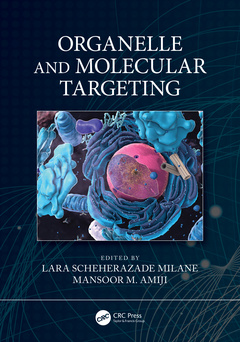Organelle and Molecular Targeting
Coordonnateurs : Milane Lara Scheherazade, Amiji Mansoor M.

We have surpassed the omics era and are truly in the Age of Molecular Therapeutics. The fast-paced development of SARS-CoV-2 vaccines, such as the mRNA vaccines encoding the viral spike protein, demonstrated the need for and capability of molecular therapy and nanotechnology-based solutions for drug delivery. In record speed, the SARS-CoV-2 viral RNA genome was sequenced and shared with the scientific community, allowing the rapid design of molecular therapeutics. The mRNA vaccines exploit the host cell endoplasmic reticulum to produce viral spike proteins for antigen presentation and recognition by the innate and adaptive immune system. Lipid nanoparticles enable the delivery of the fragile, degradation-sensitive nucleic acid payloads. Molecular-based therapeutics and nanotechnology solutions continue to drive the scientific and medical response to the COVID-19 pandemic as new mRNA, DNA, and protein-based vaccines are developed and approved and the emergency use approved vaccines are rapidly manufactured and distributed throughout the globe.
The need for molecular therapies and drug delivery solutions is clear, and as these therapies progress and become more specialized there will be important advancements in organelle targeting. For example, using organelle targeting to direct lipid nanoparticles with mRNA payloads to the endoplasmic reticulum would increase the efficacy of mRNA vaccines, reducing the required dose and therefore the biomanufacturing demand. Likewise, improving the delivery of DNA therapeutics to the nucleus would improve efficacy. Organelles and molecules have always been drug targets, but until recently we have not had the tools or capability to design and develop such highly specific therapeutics. Organelle targeting has far-reaching implications. For example, mitochondria are central to both energy production and intrinsic apoptosis. Effectively targeting and manipulating mitochondria has therapeutic applications for diseases such as myopathies, cancer, neurodegeneration, progerias, diabetes, and the natural aging process. The SARS-CoV-2 vaccines that exploit the endoplasmic reticulum (for mRNA vaccines) and the nucleic translational process (DNA vaccines) attest to the need for organelle and molecular therapeutics. This book covers the status, demand, and future of organelle- and molecularly targeted therapeutics that are critical to the advancement of modern medicine. Organelle and molecular targeting is the drug design and drug delivery approach of today and the future; understanding this approach is essential for students, scientists, and clinicians contributing to modern medicine.
Preface. Acknowledgments. Editors. Contributors. SECTION ONE: INTRODUCTION: ORGAN, TISSUE, AND CELLULAR LOCALIZATION. Route of Administration, Distribution, and Tissue-Specific Challenges. Nanomedicine and Drug Delivery Approaches. Escaping Immune Clearance. Passive Drug Delivery, Mechanisms of Uptake, and Intracellular Trafficking. Tumor Targeting. Localizing Therapeutics to the Brain. Pulmonary Drug Delivery. Cardiovascular Drug Delivery. Localizing Therapeutics to the Gastrointestinal System. Targeting Immune Cells and Dysfunction. SECTION TWO: OVERCOMING CELLULAR BARRIERS. Overcoming the Plasma Membrane. Overcoming the Mucus Barrier. Directing Therapies to Lysosomes. Microtubule Targeting in Cancer Treatment. Localizing Therapeutics to the Endoplasmic Reticulum. Targeting Mitochondria. Directed Therapies to Nucleic Acid and Cytoplasmic RNA. Considerations for Engineering Nanoparticles for Achieving Subcellular Organelle Targeting. Index.
Dr. Lara Scheherazade Milane is the Bouvé College of Health Sciences Distinguished Educator (2021) and Assistant Teaching Professor in the Department of Pharmaceutical Sciences, Northeastern University, Boston, MA. Her research interests include mitochondrial nanomedicine and developing nanotechnology based solutions to manipulate cell communication. Dr. Milane is particularly interested in applications for treating multidrug resistant cancer and neurodegenerative diseases. Dr. Milane is also an advocate for women in science, and has 21 peer-reviewed articles, 3 white papers, and 5 book chapters.
Dr. Mansoor M. Amiji is the University Distinguished Professor, Professor of Pharmaceutical Sciences, and Professor of Chemical Engineering at Northeastern University in Boston, MA. His primary areas of research interest are in the development of targeted therapeutic solutions for chronic diseases such as cancer, neurodegenerative diseases, and inflammatory diseases. Dr. Amiji has edited 10 books including Applied Physical Pharmacy (now in 3rd edition), Nanotechnology for Cancer Therapy (Taylor & Francis, 2007), Handbook of Materials for Nanomedicine (Pan Stanford Publishing, 2010), and Diagnostic and Therapeutic Applications of Exosomes in Cancer (Elsevier, 2018) along with over 70 published book chapters, and over 360 peer-reviewed articles.
Date de parution : 12-2021
17.8x25.4 cm
Disponible chez l'éditeur (délai d'approvisionnement : 14 jours).
Prix indicatif 244,87 €
Ajouter au panierThèmes d’Organelle and Molecular Targeting :
Mots-clés :
Drug Delivery; Brain Targeted Drug Delivery; EVs; Clathrin Mediated Endocytosis; Endocytic Pathway; mRNA Vaccines; TNBC; Delivery Systems; 1B Light Chain; Active Transport; ER Target; Late Endosomes; Endocytosis Pathways; Plasma Membrane; Nuclear Pore Complex; Mucin Dispersion; MTAs; Brain CSF Barrier; M1 Macrophage; ER Stress; ER Sheet; M1 Polarization; CMT; FLT3 Inhibitor; Clathrin Coated Vesicles



